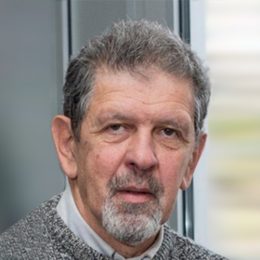
Frano Barbir is Professor Emeritus at Faculty of Electrical Engineering, Mechanical Engineering and Naval Architecture, University of Split, Croatia, where he is employed as a Project Activity Leader at Center of Excellence for Science and Technology – Integration of Mediterranean Region (STIM).
He has been actively involved in hydrogen and fuel cell technology R&D, engineering and applications since 1989, working in U.S. as a researcher and R&D manager in both industry (Energy Partners, Proton Energy Systems) and universities (University of Miami, University of Connecticut) and in Turkiye as the Associate Director of Science and Technology of the UNIDO – International Center for Hydrogen Energy Technologies.
His research interests include heat and mass transfer in PEM fuel cells, effects of operational conditions on fuel cell performance and durability, design of fuel cells and fuel cell stacks and systems, fuel cell applications, and hydrogen energy concept and its role in context of energy future. He has authored and/or co-authored more than 300 papers on hydrogen and fuel cells published in scientific and technical journals, books, encyclopedias, and conference proceedings, as well as 7 U.S. and one EU patent on various aspects fuel cell stack and system design and operation. His book, PEM Fuel Cells: Theory and Practice, published by Elsevier/Academic Press in 2005 (2nd edition came out in 2013), has been translated to Chinese, Korean and Farsi, and it is being used as a textbook at many universities all over the world.
He is the Founding President of Croatian Hydrogen Association, a Vice President of the International Association of Hydrogen Energy, and a Croatian representative in the States Representatives Group at Clean Hydrogen Partnership. He is a member of the Croatian Academy of Technical Sciences, and a recipient of Croatian Annual National Science Award lifetime achievement in technical sciences.
Prof. Barbir holds a Dipl.-Ing. degree in mechanical engineering and an M.Sc. degree in chemical engineering both from University of Zagreb, Croatia, and a Ph.D. degree in mechanical engineering from University of Miami, Coral Gables, FL.
Session on Hydrogen, Fuel Cells and electrofuels
Abstract
Hydrogen produced from renewable energy sources enables decarbonization of otherwise hard to decarbonize energy sectors. The transport sector can be decarbonized with electricity from renewable energy sources, but hydrogen can greatly assist in it, particularly in heavy-duty, long-distance transport such as buses, trucks, and trains. Although hydrogen can be used as a fuel in internal combustion engines, its use in fuel cells is more efficient. Hydrogen fuel cell vehicles are, thus, also electric vehicles, and they differ from battery electric vehicles only in the way of on-board storage of energy. Batteries are of course much more efficient, but hydrogen and fuel cells offer advantages of faster refuelling, lower weight and separation of energy and power. For even heavier duty and longer distance transport such as maritime and air transportation, hydrogen storage may be a hindrance, so, instead of hydrogen, so called e-fuels, produced from renewable hydrogen, may be used. This lecture will give a comprehensive overview of technology status for hydrogen use in transport, including both vehicle technology and hydrogen supply infrastructure, and will attempt to evaluate/predict where hydrogen and fuel cells offer sufficient advantage to make significant contribution to decarbonization of transport.